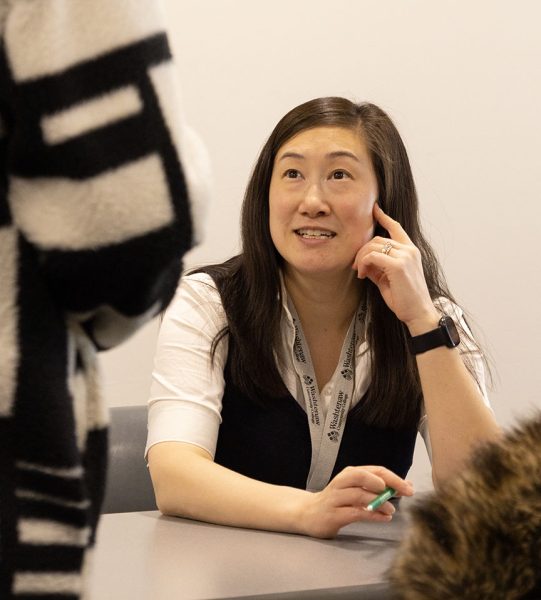

An adviser talks to students about transferring. Paula Farmer | Washtenaw Voice
By Jacob Kuiper
Staff Writer
Transfering courses and credits between institutions is an integral part of what it means to go to WCC. Around two-thirds of the student body at WCC plans to transfer credits or has transferred credits in some way, according to WCC Transfer and Articulation Coordinator Kelly Holcomb. Here are her biggest tips on how to transfer to success.
Figure out what you want to study
When trying to transfer, the first thing you should do is try to figure out what you want to study and major in. From there you can narrow down what schools you want to look at by if they have your major or not. You can then narrow it down further by considering other factors like location.
Look for course equivalencies
Once you’ve narrowed down your school choices, you need to see what specific courses from your current school will transfer. These are known as “course equivalencies,” and they can be found on most school transfer websites. You will need to make sure that courses you are taking will be accepted as credit for your receiving institution’s classes and will count towards your major there.
A good resource for simplifying this process is mitransfer.org. With this website you can find resources on transferring, see how your credits transfer and explore articulation agreements and transfer pathways for dozens of participating colleges in Michigan. “It’s a nice one stop shop for transferring,” Holcomb said.
Maximize the number of credits you can transfer
Typically you can only transfer 60 credits, or about half a bachelor’s degree, between any two institutions, but there are many ways that you can transfer more. At University of Michigan institutions, for instance, they typically only allow 60 credits to transfer but if you have completed an associates degree that number is bumped up to 62.
Also keep a look out for articulation agreements and other enhanced programs between colleges. Articulation agreements are documents between colleges that lay out transfer plans between two programs. WCC, for instance, has an articulation agreement with Eastern Michigan University in their Criminology and Criminal Justice Bachelor of Arts that lets you transfer a whopping 94 credits, which is over 78% of the 120 credits hours required. Agreements like these can help you save time and money.
Scholarship deadlines
Remember that deadlines for scholarships and financial aid may be different than the application deadline. Sometimes they are even before.
Utilize WCC to the fullest
Holcomb stressed that it is extremely helpful to meet with your WCC adviser. “They help you not only with picking out your courses here…Our advisers have a lot of experience helping students with transferring,” she said.
WCC also has visits where you can meet one-on-one with a college representative, and events where you can work with transfer specialists and hear from WCC alumni on their transfer experience.
The Transfer to Success club on campus can also help. “You can be in any major, you may already know where you want to go or…this could be your first week at WCC,” says Holcomb, who serves as adviser. “It’s open to any student. There’s no GPA requirement.”
Holcomb also advises to utilize WCC’s success coaches and free tutoring.
Look for help from outside organizations
Certain outside organizations like Phi Theta Kappa can also help you on your journey. “It’s an honors society and it’s for…community college students….They have scholarships available for PTK members.” Holcomb explains. Certain universities will also have scholarships specifically for transferring PTK students. The organization is somewhat exclusive though. “You do have to be invited to join and you have to have a certain GPA,” Holcomb said. There is also a one time admission fee of $90 but that can be waived.
Remember to apply to graduate
A small but important detail of getting your associate degree that is often overlooked is that you must apply to graduate. This is a simple form to fill out to make sure you receive that right degree. Forgetting to do this can delay your graduation.
Other things to look out for
Holcomb warns that many students forget to send their final transcripts. Even after you have been accepted to your next school you need to send your grades for your last semester. Not doing his can risk credits transferring, scholarships and financial aid lost, and even being kicked out.
Another small thing is to look into application fee waivers. Application fees to certain institutions can be fairly pricey ($75 for U-M) and can add up quickly when applying to multiple schools. Many don’t know that these fees can be waived fairly easily. “Some of them will just say if you meet with…the admissions office beforehand you can get it waived,” Holcomb said.
Laura Chodoroff | Washtenaw Voice
Below are recent employment want ads that have been posted with WCC Center for Career…
Zakeria Almajrabi | Photo and Writing Contributor TEDxWCC is an annual event hosted towards the…
Some policies under review amid federal changes Lily Cole | Editor ONGOING COVERAGE At the…
5 first place honors received, including general excellence Alice McGuire | Deputy Editor On April…
Possible cuts, addition to be discussed at next meeting Yana McGuire | Staff Writer WCC’s…
Zachary Cleveland | Contributor Upwards of 1,500 Washtenaw County residents gathered under a chilly grey…